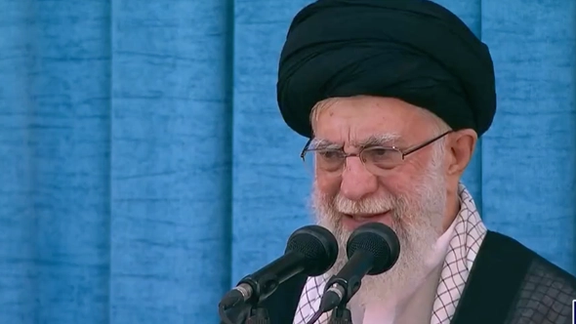Iran's Khamenei Says Region Needed the October 7 Attack

Iran’s Supreme Leader Ali Khamenei on Monday openly endorsed the October 7 Hamas attack on Israel, saying “Our region was very much in need of this attack.”

Iran’s Supreme Leader Ali Khamenei on Monday openly endorsed the October 7 Hamas attack on Israel, saying “Our region was very much in need of this attack.”
Khamenei was speaking at a ceremony marking the 35th anniversary of Ayatollah Ruhollah Khomeini’s death, who was the founder of the Islamic Republic.
Khomeini believed that Palestinians should not rely on negotiations for compromise and must take action themselves to claim their rights and force the enemy to retreat, Khamenei said.
The Supreme Leader praised the attack “as a huge blow to Israel," signaling an escalation in rhetoric from Tehran. He also accused the United States and Israel of orchestrating a vast scheme aimed at altering regional dynamics, further intensifying the geopolitical tensions in the Middle East.
Khamenei reiterated that the October 7 attack shattered a long-term plan by the US, Israel, and some regional countries to change existing dynamics and establish ties with Jerusalem. "Given the situation over the past eight months, there is no hope for reviving such a plan."
"The Zionist regime has completely misjudged the capabilities of the resistance front," he added. "The Zionist regime is melting before the eyes of the world... They have, by their own actions, entered a dead-end corridor from which failures continue to follow one after the other, and from which they will not be able to escape."
The Islamic government in Iran has staunchly backed Palestinian and other militant groups in the region during Khamenei's 35-year authoritarian rule.
In many stances, it was Tehran’s Revolutionary Guard that created armed groups in Lebanon, Iraq, Yemen and Syria, providing both financial and military support, mainly with the aim of weakening Israel and the United States.
In November, Khamenei urged Muslim nations to blockade Israeli trade, after which Yemen’s Houthis began targeting international commercial ships in the Red Sea and the Indian Ocean, disrupting trade.
Khamenei on numerous occasions hailed the October 7 attack but implicitly denied Tehran’s direct involvement in the operation. He reiterates Tehran’s long-held policy of demanding a referendum to decide the fate of Palestine and Israel, but at the same time calls for the “Al-Aqsa Flood” to be repeated, which was in essence an attack on civilians and widespread and indiscriminate killings.
He harshly decries the Israeli attacks in Gaza, without mentioning that the campaign began after Hamas killed 1,200 people in Israel, mostly civilians. He insists that Israel’s military operation has been a disgrace for the United States and other Western countries that have supported it.